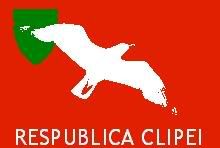Iansisle

| |
| Flag of Iansisle | |
| Motto: "Debate Triumphs Over All" | |
| [1] | |
| Region | NPIG |
|---|---|
| Capital | Ianapalis |
| Official Language(s) | English |
| Leader | King James I; Premier Charles Bradsworth |
| Population | c. 320,000,000 |
| Currency | General |
| NS Sunset XML | |
Contents
Overview
The United Kingdom of Iansisle is the primary state which grew out of the collapse of the Grand Empire of the Shield. The others are the Republic of Weshield, the Socialist Democracy of Wyclyfe, and the Kingdom of the Foothills. The United Kingdom consists the former kingdoms of Shadoran, Vesshampton, and Thortraia and the Archduchy of Sentry Island.
Formation of the United Kingdom
After the corporatist powers which had occupied Ianapalis (see Corporate Yoke) withdrew on 3 August 1952, Charles Bradsworth set about remaking the old empire. The Combined Parliament became the Constituent Assembly, which remains the state’s only legislative body. The High King of the Empire became the King of Iansisle and Emperor of Gallaga. Nearly all major companies, especially those which had participated in the Corporate Yoke, were nationalized. Bradsworth himself became the Premiere Interim of the Provisional Government of the United Kingdom.
The Constituent Assembly
The Constituent Assembly is a bicameral legislature consisting of a higher house (the Congress) and a lower house (the Assembly).
The one and only duty of the fifty-two people, appointed by the Assembly, who sit in the Congress is the drafting of a new constitution for Iansisle, to take effect after being voted on by the Assembly. To date, the government has not released how much progress has been made on writing the constitution since the Revolution. HRM the King is the nominal head of the Congress, but the Premiere Interim actually fills that duty. In theory, the King would need to approve the constitution before it is sent to the Assembly, but the Premier Interim - as Lord Privy Seal - decides what the monarch does and does not sign.
The Assembly consists of two hundred and sixty-four representatives elected biyearly by the sixty-two boroughs and twenty-six counties of the United Kingdom. The Assembly is then broken down into twenty-two directorships, each with its own committee of twelve representatives. The Director, on the advise of the committee, submits legislation from his directorship’s area to be voted on by the full Assembly. Directors and committee members are elected by the Assembly to their position after the general elections. Debates are supervised by the Premier, who can also introduce his own legislation for general vote.
Currently, the Assembly is appointed, but the first elections are set to take place on 18 May 1953.
The Premier
Unlike the Prime Minister of the Combined Parliament of the old Empire and Commonwealth, the Premier of the Assembly is elected by a nationwide vote. The Premier serves as Speaker of the Assembly and President of the Congress, as well as Lord Privy Seal.
Charles Bradsworth has added the word ‘Interim’ to his title, reminding all that he has not yet been elected. The first election for the Premiership is expected to take place concurrently with the Assembly’s general election on 18 May 1953.
The Monarchy
The King of Iansisle doesn’t have quite the same level power of power as did the High King of the Empire. Although his agreement is still needed for most legislation, the Lord Privy Seal can now sign documents against the King’s will. The monarchy mostly exists to placate conservative forces within the United Kingdom.
The royal line is the House of Callahan, the monarchs of Shadoran and the royal family of the Grand Empire. The King lives in Dûn Ádien, the castle on Ian’s Island which has served as the home of House Callahan since the razing of Dûn Shadoran in 1697.
The Empire and Gallaga
The Grand Empire bequeathed a number of colonies in South East Asia, centered around the island of Borneo, and Troobodia Bay, most notably Dianatran, to the United Kingdom. However, with the nationalization of the East Gallaga Company, the United Kingdom was faced with the problem of administering a country three times as large as itself with more than six and a half times as many people.
A quick solution had to be found, and the Assembly quickly readopted the Gallaga Act of 1750. Although the language and social structure was all wrong, it would have to do. Richard Appleton was elected Director of the Gallaga Office by the Assembly, and he appointed the Earl of Furthingham as the fifty-second President of the Council of the New Shield but only the second Governor-General and Viceroy of Gallaga. The King also reassumed the title Emperor of Gallaga.
